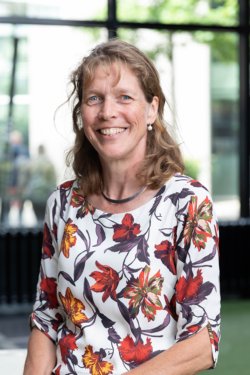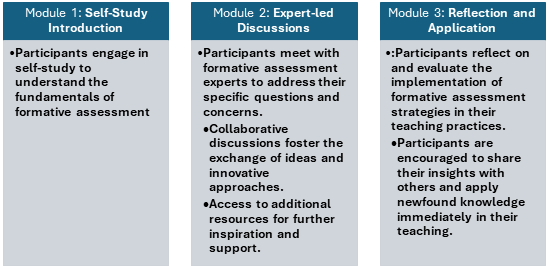 Cornelise Vreman-de Olde, who is a teacher and secretary of the Board of Examiners in the Advanced Technology programme at the Faculty of Science & Technology (TNW), holds a background in physics and a PhD in Education, offering expertise in both subject matter and pedagogy. In her current role, she coordinates modules and projects while actively engaging in the Preparation - Bachelor’s assignment course. With extensive experience in formative assessment, including the design and implementation of a professional development course for teachers, Cornelise shares her insights and best practices on this topic in this article.
Cornelise Vreman-de Olde, who is a teacher and secretary of the Board of Examiners in the Advanced Technology programme at the Faculty of Science & Technology (TNW), holds a background in physics and a PhD in Education, offering expertise in both subject matter and pedagogy. In her current role, she coordinates modules and projects while actively engaging in the Preparation - Bachelor’s assignment course. With extensive experience in formative assessment, including the design and implementation of a professional development course for teachers, Cornelise shares her insights and best practices on this topic in this article.
How do you define formative assessment, and why do you believe it's important in the context of higher education?
As educators, our journey with students involves imparting knowledge and assessing their ability to apply it effectively. Formative assessment is crucial in this process, providing ongoing support and guidance by offering feedback for students to adjust and improve their learning. It serves as a vital tool in facilitating their progress and ensuring they stay on track towards mastering the subject matter.
Can you describe how you integrate formative assessment techniques into your teaching practices and provide an example? Are there specific formative assessment activities that are more efficient in disciplines like engineering, mathematics, and physics?
Utilizing formative assessment is pivotal for student learning. In the Bachelor assignment, students engage in a multi-step process. Initially, they explore research topics in small groups, offering and receiving peer feedback. Using Canvas, students upload and review each other's research proposals, fostering collaboration and constructive criticism. Subsequent writing and feedback sessions lead to iterative improvements, culminating in final proposal presentations. In disciplines like engineering, mathematics, and physics, effective formative assessment includes problem-solving exercises, concept mapping, and peer review. While the tool Wooclap is occasionally used for in-class assessments, it's not extensively utilized in my project-focused course.
How do you ensure accurate and effective peer feedback, especially when students may provide feedback that's not entirely correct?
To ensure accurate peer feedback:

What challenges have you faced in implementing formative assessment practices, and how did you address them?
Student motivation can often be a challenge for providing feedback in peer assessment activities. Allowing students to choose their own groups can indeed enhance their willingness to engage in the feedback process. When students have the freedom to work with peers, they are comfortable with or consider friends, they are more likely to feel invested in each other's success and therefore more inclined to provide constructive feedback.
How do you refine formative assessment through colleague collaboration and professional development?
In modules two and five, I collaborate with physics teachers to provide intermediate feedback to students on their projects. We use a similar approach for giving feedback on intermediate products. In the past, I have also had a collaboration with a.o. Kim Schildkamp (BMS-ELAN) within the Acceleration Plan for Educational Innovation with ICT, Proeftuin (digital) formative assessment. Together, we’ve developed a course for teachers on formative assessment. We’ve developed quite some materials that are now available for downloads which can be valuable resources for teachers to use.
Can you share details about the formative assessment course you taught and its value for teachers? What other formative assessment initiatives have you been part of?
In the formative assessment course, participants actively engage by bringing their questions and seeking guidance on implementing formative assessment strategies in their respective settings. Through collaborative discussions, participants exchange ideas, share experiences, and brainstorm innovative approaches to integrate formative assessment into their teaching practices. The course includes the following modules:

In a nutshell, what are three practical tips that you would give other teachers for maximizing the effectiveness of their formative assessment practice?
- Repetition: Reinforce key concepts over time for deeper understanding.
- Reflection: Encourage students to summarize and relate new knowledge to existing understanding.
- Summarization: Prompt students to summarize learning to strengthen metacognition.





